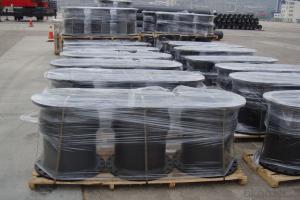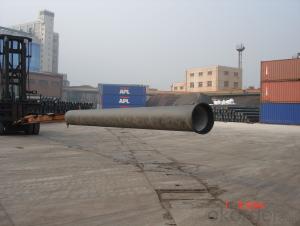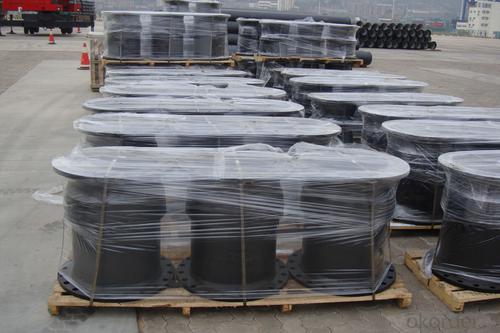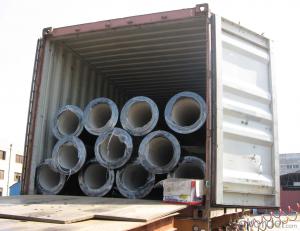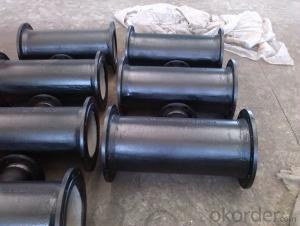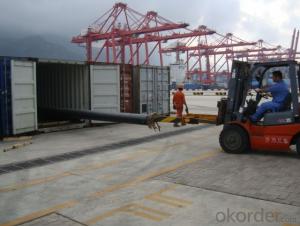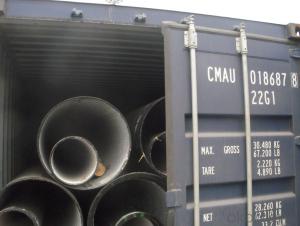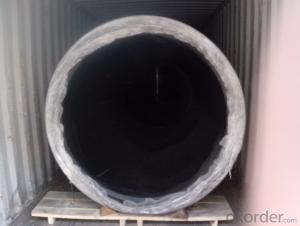DUCTILE IRON PIPE C Class DN 600
- Loading Port:
- Tianjin
- Payment Terms:
- TT OR LC
- Min Order Qty:
- -
- Supply Capability:
- 30000Tons m/month
OKorder Service Pledge
OKorder Financial Service
You Might Also Like
CNBM ductile iron pipe ranges from DN80-DN1600mm (T-Type, Class K9), effective length 6m, comply with ISO2531 Standard
Company Profile
CNBM International Corporation is the leading production base and renowned supplier of Ductile Iron Water Pipe systems of both potable and waste water in China. We are constantly looking to develop high quality products to ensure the longest service life and wonderful performance.
CNBM Pipelines regard quality as the essential factor leading to successful business. Every pipe is tested in accordance with BS EN545 (water application) or BS EN598 (sewer application). CNBM Pipelines products comply with and are tested according to the relevant European and International Standards. Our pipes are manufactured under the quality management system BS EN ISO 9001. After years of efforts, CNBM Pipelines has built up great reputation in terms of quality and service among customers worldwide
Product Introduction
CNBM ductile iron pipe ranges from DN80-DN1600mm (Tyton, T-Type, Class K7/K8/K9), effective length: 6m, complying with BS EN545/EN598/ISO2531/BS4772.
Specification& Payment terms
Internal lining: Pipes shall have an internal cement mortar lining in acc with ISO4179.
External coating: Pipes shall be externally coated with metallic zinc spray plus a further layer of resin painting to ISO8179.
Gasket: 100% SBR/NBR/EPDM gasket in accordance with ISO4633.
Packing: Pipes from DN100 to DN300 be bundled with steel belts, the others are in bulk.
Payment term: By 30% T/T advance payment + 70% Irrevocable L/C at sight.
Packing: In bulk vessel or in container.
- Q: Can ductile iron pipe be used for both water and sewage applications?
- Yes, ductile iron pipe can be used for both water and sewage applications. It is a durable and versatile material that is resistant to corrosion and can handle the pressure and flow requirements of both water and sewage systems.
- Q: Can ductile iron pipes be used for water supply in remote areas?
- Yes, ductile iron pipes can be used for water supply in remote areas. Ductile iron pipes are known for their strength, durability, and versatility, making them suitable for various applications, including water supply systems. These pipes have a high resistance to corrosion and can withstand harsh environmental conditions, making them ideal for remote areas where the availability of maintenance and repair services may be limited. Additionally, ductile iron pipes have a longer lifespan compared to other materials, ensuring the longevity of the water supply system in remote areas. Overall, ductile iron pipes are a reliable choice for water supply in remote areas due to their durability, corrosion resistance, and long lifespan.
- Q: Can ductile iron pipe be used for directional drilling?
- Yes, ductile iron pipe can be used for directional drilling. It is a strong and durable material that can withstand the stresses and forces encountered during directional drilling operations. Its flexibility and resistance to damage make it a suitable choice for this application.
- Q: Can ductile iron pipes be used for oil and gas pipelines?
- Ductile iron pipes can indeed be utilized for oil and gas pipelines. This robust and long-lasting material possesses corrosion resistance, rendering it ideal for the transportation of oil and gas across extensive distances. Moreover, ductile iron pipes display exceptional pressure-bearing capabilities, enabling them to endure the high pressures commonly associated with oil and gas transportation. Additionally, the installation and maintenance of ductile iron pipes are relatively straightforward, further enhancing their suitability for oil and gas pipelines. Nevertheless, it is crucial to acknowledge that the specific application and conditions of the pipeline necessitate careful consideration. Therefore, seeking advice from industry experts is strongly recommended to ensure the appropriate selection and installation of ductile iron pipes for oil and gas transportation.
- Q: How does ductile iron pipe handle changes in pipe diameter or size?
- Ductile iron pipe offers a convenient solution for dealing with alterations in pipe diameter or size. Its excellent flexibility and capacity to adapt to changes in pipe dimensions without compromising its structural integrity are a result of its unique composition, which contains a significant amount of graphite nodules that provide ductility and elasticity to the material. When faced with adjustments in pipe diameter or size, ductile iron pipe can be easily manufactured or modified to meet specific requirements. It can be cast or fabricated in different diameters and lengths, allowing for seamless integration and adaptability within a pipeline system. This versatility proves particularly advantageous when connecting different pipe sizes or making alterations to the pipeline layout. Furthermore, the superior mechanical properties of ductile iron pipe enable it to withstand the stresses and forces associated with changes in pipe diameter or size. It possesses high tensile strength, impact resistance, and durability, ensuring its ability to handle the internal and external pressures exerted on the pipe during operations. Moreover, the jointing systems employed with ductile iron pipe contribute to its ability to handle changes in diameter or size. Various joint types, including push-on, restrained, or mechanical joints, provide secure and leak-free connections between different pipe sections. These joints facilitate easy assembly and disassembly, enabling efficient adjustments to the pipe diameter or size as required. In conclusion, ductile iron pipe is well-equipped to handle changes in pipe diameter or size due to its inherent flexibility, adaptability, and robustness. Its composition, manufacturing capabilities, and jointing systems all contribute to its capacity to accommodate variations in pipe dimensions without compromising its performance.
- Q: A tube is used only in ductile iron pipes, isn't it?
- Is that the nodular graphite cast iron pipe is called centrifugal ductile iron pipe, it has the properties of nature, iron and steel, excellent corrosion resistance, good ductility, good sealing effect, simple installation, mainly for municipal, industrial and mining enterprises, water supply, gas, oil etc.. Water supply pipe is the first choice, with high cost performance.
- Q: Can ductile iron pipes be used for water treatment plants?
- Yes, ductile iron pipes can be used for water treatment plants. Ductile iron pipes are often chosen for water treatment plants due to their durability, strength, and corrosion resistance. They can handle high-pressure water systems and are resistant to wear and tear, making them suitable for transporting treated water in large quantities. Additionally, ductile iron pipes have a long lifespan, which reduces the need for frequent replacements and maintenance, making them a cost-effective choice for water treatment plants.
- Q: Is there any cast iron pipe used in the fire hose?
- No, I think so. In theory, you can.See if the specifications have any requirements for the material.
- Q: Advantages and disadvantages of ductile iron pipes?
- The ductile iron pipe has a single length of 6 meters and a large wall thickness. The cast iron tube has a single branch length of 3 meters and a thinner wall thickness.
- Q: How does ductile iron pipe perform in extreme weather conditions?
- Ductile iron pipes are renowned for their exceptional performance in adverse weather conditions. These pipes demonstrate remarkable durability, resistance, and flexibility, making them suitable for enduring harsh weather such as extreme temperatures, heavy rainfall, snowfall, and even earthquakes. One of the notable characteristics of ductile iron is its capacity to withstand damage caused by freezing temperatures. Unlike other materials, ductile iron pipes possess a low coefficient of thermal expansion, enabling them to resist the expansion and contraction that occurs during freeze-thaw cycles without experiencing cracks or breaks. Consequently, these pipes remain intact and continue to function optimally even in extremely cold conditions. Furthermore, ductile iron pipes exhibit excellent resistance to corrosion, rendering them highly resilient to the corrosive effects of severe weather. They are shielded by a sturdy zinc coating, which acts as a barrier against rust and other forms of corrosion. This coating, in conjunction with the inherent strength of ductile iron, grants these pipes exceptional resistance to the corrosive effects of rain, snow, and moisture. Moreover, ductile iron pipes possess superior flexibility, allowing them to accommodate ground movement and seismic activity. In areas prone to earthquakes or soil shifting, these pipes can absorb stress and strain without fracturing, guaranteeing a continuous supply of water and sewage services even in the most challenging weather conditions. Overall, ductile iron pipes excel in extreme weather conditions due to their durability, resistance to freezing, corrosion, and flexibility. Their ability to withstand the elements ensures an uninterrupted supply of water and sewage systems, providing reliability and peace of mind to utility providers and communities, even in the most unforgiving environments.
Send your message to us
DUCTILE IRON PIPE C Class DN 600
- Loading Port:
- Tianjin
- Payment Terms:
- TT OR LC
- Min Order Qty:
- -
- Supply Capability:
- 30000Tons m/month
OKorder Service Pledge
OKorder Financial Service
Similar products
Hot products
Hot Searches
Related keywords
